| Srl | Item |
| 1 |
ID:
113216
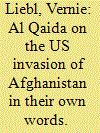

|
|
|
|
|
| Publication |
2012.
|
| Summary/Abstract |
This article consists of selected translations from captured interviews and dairies of Al Qaida members. The time period covered is from mid-2001 to early 2002 and concerns their operations in Afghanistan. The material clearly conveys a range of emotion, from confident to despondent, as well as efforts to contest the US actions. The first several pages give the reader context and some possible "lessons learned," but the story(ies) are best told by the Al Qaida members themselves. All names are pseudonyms.
|
|
|
|
|
|
|
|
|
|
|
|
|
|
|
|
| 2 |
ID:
120723
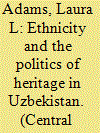

|
|
|
|
|
| Publication |
2013.
|
| Summary/Abstract |
The UNESCO office in Uzbekistan has been relatively successful in nominating cultural practices to The Representative List of the Intangible Cultural Heritage of Humanity. Selection for the List conveys prestige and draws international attention to local culture that is deemed of universal value. What is striking about the first successful nominations from Uzbekistan is that they point to the inseparability of Tajik and Uzbek culture, a touchy subject for both Uzbekistan and Tajikistan. In this article the author looks at how the politics of ethnic cultural heritage play out through these projects, highlighting the tensions between a rhetoric of diversity promoted both by UNESCO and by the official national ideology, and practices that demonstrate a more mundane, ethnically exclusive sense of national culture. Although ostensibly celebrating the rich diversity of Uzbekistan's national culture and eschewing the strict delineation of Tajik culture from Uzbek culture, the effect of UNESCO Intangible Cultural Heritage programmes is to perpetuate the occlusion of Tajik culture in Uzbekistan.
|
|
|
|
|
|
|
|
|
|
|
|
|
|
|
|
| 3 |
ID:
140382
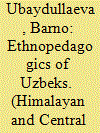

|
|
|
| 4 |
ID:
101336
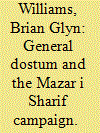

|
|
|
|
|
| Publication |
2010.
|
| Summary/Abstract |
This report sheds new light on the CIA and US Special Forces' covert campaign alongside Afghan Northern Alliance leader General Dostum's horse-mounted Uzbeks during 2001's Operation Enduring Freedom. In 2003 and 2005 the author traveled over the Hindu Kush Mountains to the plains of Northern Afghanistan and lived with the legendary Northern Alliance opposition leader General Dostum. His aim was to recreate Dostum's campaign alongside the CIA and Special Forces to seize the holy city of Mazar i Sharif from the Taliban in November 2001. Based on interviews with Dostum and his Uzbek commanders, this article recreates this proxy offensive that saw the Northern Alliance opposition break out of the mountains, seize this shrine town and bring the Taliban house of cards falling down in a matter of weeks. Up until now the indigenous Afghan Uzbeks, who played a crucial role as a 'boots on the ground' fighting force for Centcom, have been cast as a mere backdrop for American heroics. Now their side of the story and their links to the mysterious shrine of Mazar i Sharif are for the first time revealed.
|
|
|
|
|
|
|
|
|
|
|
|
|
|
|
|
| 5 |
ID:
132224
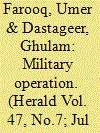

|
|
|
| 6 |
ID:
120745
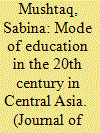

|
|
|
| 7 |
ID:
091831


|
|
|
|
|
| Publication |
2009.
|
| Summary/Abstract |
Nation-building today is more often the practice of assisting countries overcome conflict and build effective and legitimate political institutions. The United States has had a significant role in virtually all of the post-cold war attempts at nation-building, from
Cambodia to El Salvador to Bosnia- with supporting roles by other international and regional organizations, states, and nongovernmental organizations.
|
|
|
|
|
|
|
|
|
|
|
|
|
|
|
|
| 8 |
ID:
110317
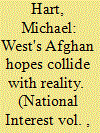

|
|
|
|
|
| Publication |
2012.
|
| Summary/Abstract |
THE WEST'S military engagement in Afghanistan is entering its eleventh year and has another two years to go before the end of combat operations in 2014. Whatever the result of the international conferences that began last year in Istanbul and Bonn to elicit support for a successor state, one thing is clear: after Western forces draw down, Afghanistan won't bear much resemblance to the Western vision that fueled the intervention in the first place.However effective Western military organizations are in transitioning to Afghan control, the country's future will not be decided primarily by the residual structures and legacies of Western involvement, the current Taliban insurgency or even any formal process of reconciliation. Rather, it will be decided more by the country's ethnic character, the particular nature of local and national governance, and the influence of neighboring powers with enduring geopolitical and strategic imperatives in the region far stronger than those of the West.
|
|
|
|
|
|
|
|
|
|
|
|
|
|
|
|